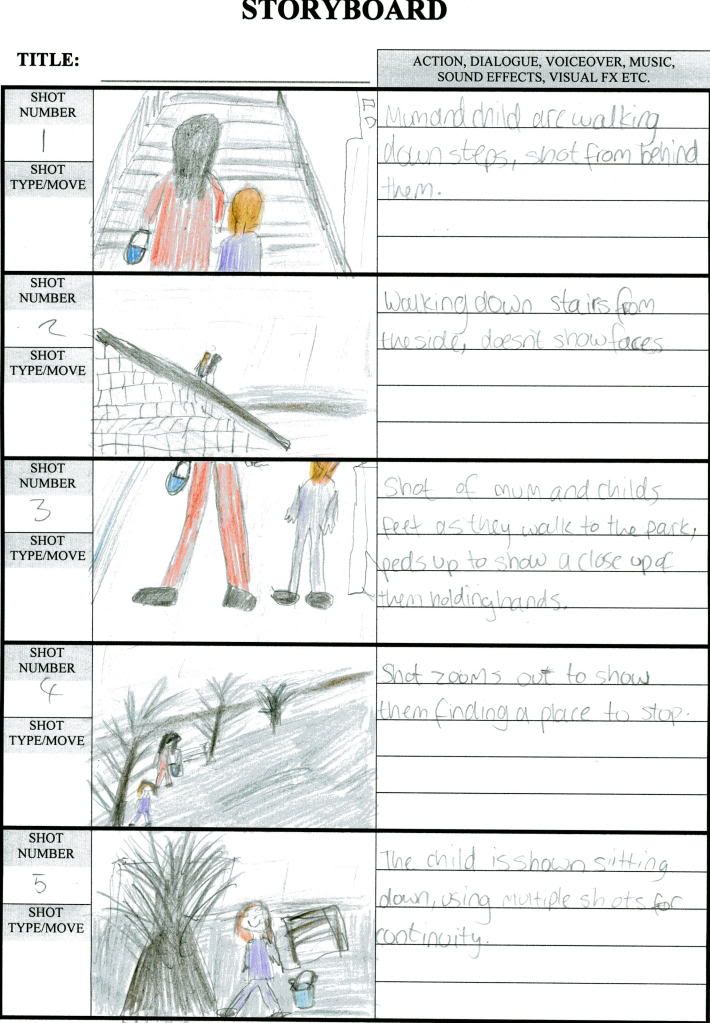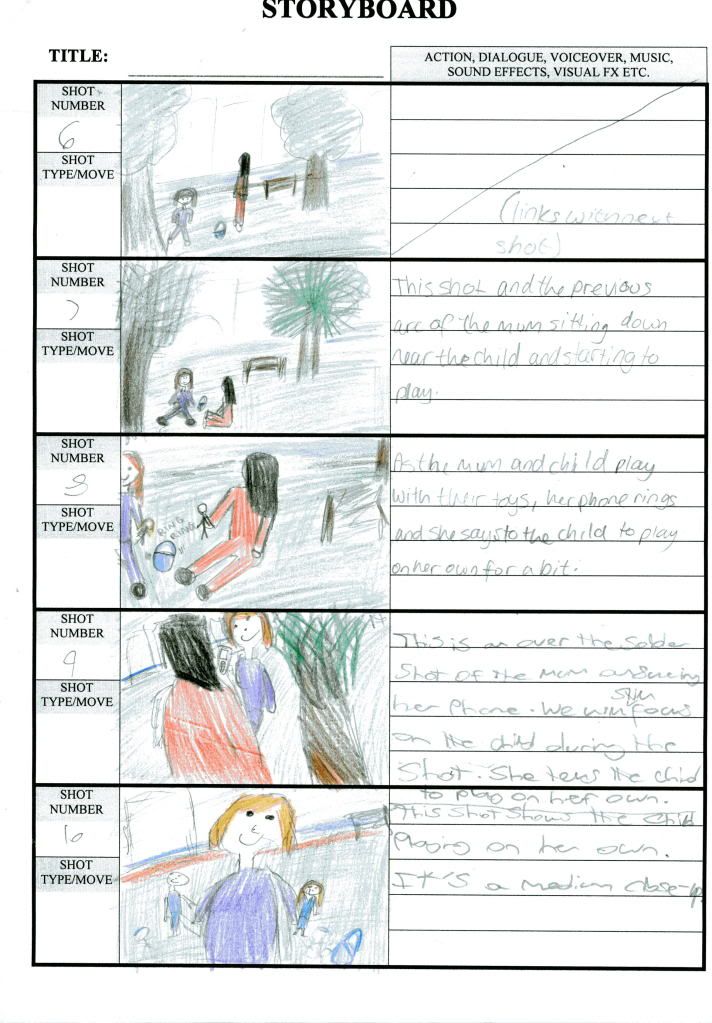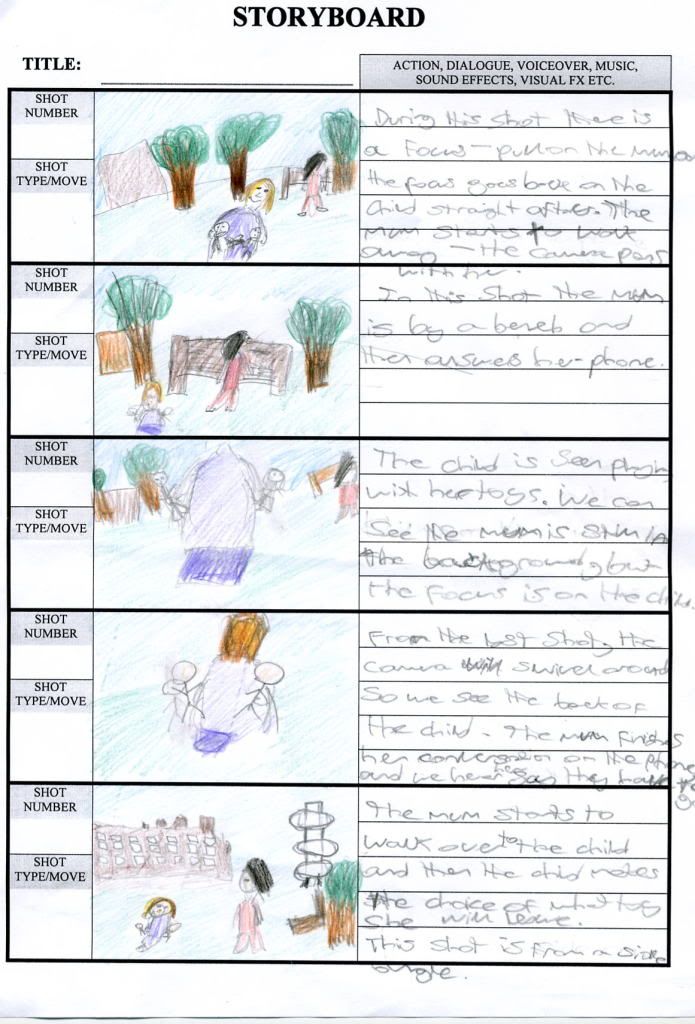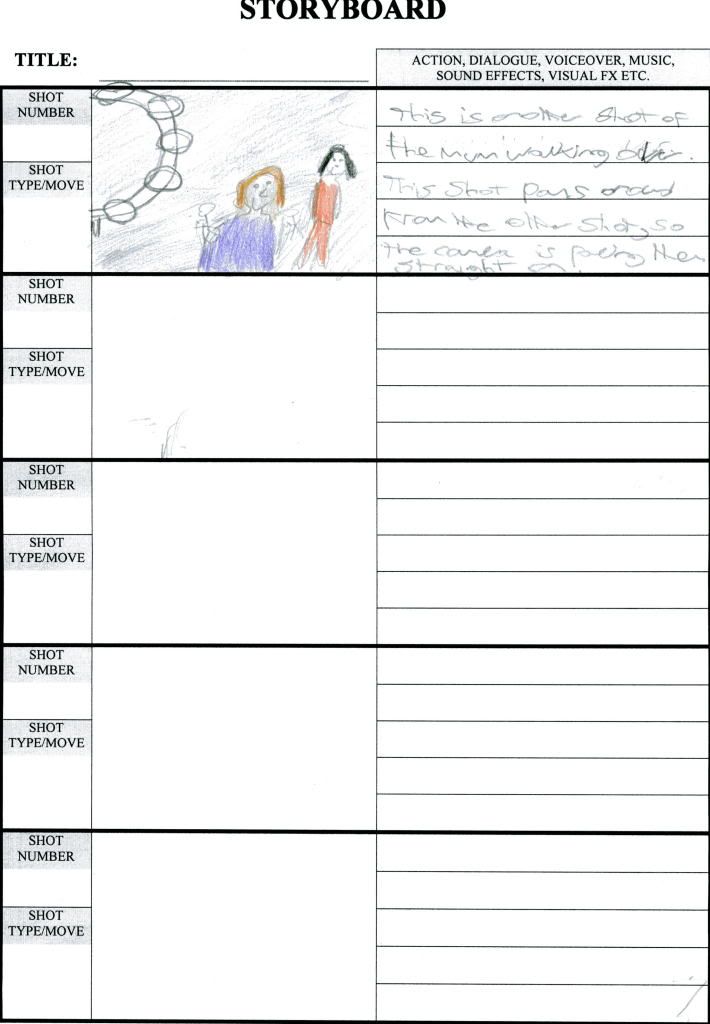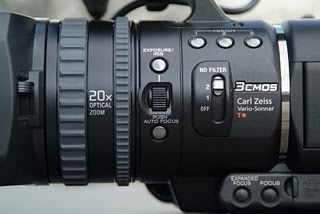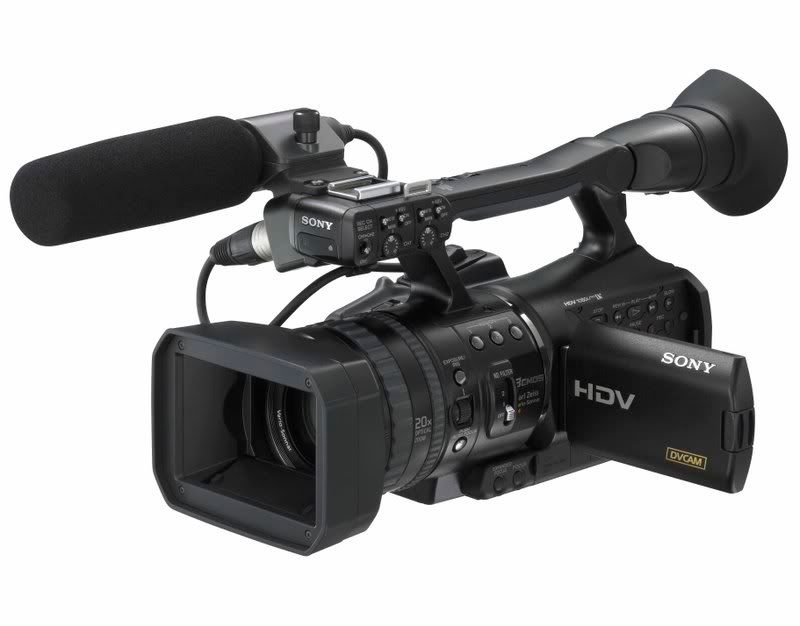One of our influences was scene from a film called “Mud Boy” which is about a young girl who discovers something that she shouldn’t. The scene features the girl playing with a toy in each hand and they have some sort of conversation together.
Monday 29 November 2010
How does the piece conform to short film codes and conventions?
Our film does conform to the codes and conventions which you would expect from a short film. When finished it will be roughly 5 mintues in length. It only contains 3 characters and contains a an interesting storyline.
A lot of short films are made to help to give awareness of something and our film is an example of this as it gives awareness of domestic violence.
A lot of short films are made to help to give awareness of something and our film is an example of this as it gives awareness of domestic violence.
Where we are up to
We have made a number of changes to our original ideas that we had. To start with, we filmed in a different location (Crystal Palace Park) as it was eaiser to get to in the time that we had. We then also used two girls instead of one as each child could hold a doll each and thi would look better on-screen.
We have decided that we are also going to film additional footage which will help to give the film more depth. This fottage will also have a voiceover within it. The storyline which we have gone with is that about 20 years in the future (when the girls are in their early-mid 20s), one of them is moving in with their boyfriend and while see is packing her things, she comes across and dolls andhas a flashback in which she remembers the time when she went to the park.
The girl is now also a victim of domestic violence, just like her mum was.
We have decided that we are also going to film additional footage which will help to give the film more depth. This fottage will also have a voiceover within it. The storyline which we have gone with is that about 20 years in the future (when the girls are in their early-mid 20s), one of them is moving in with their boyfriend and while see is packing her things, she comes across and dolls andhas a flashback in which she remembers the time when she went to the park.
The girl is now also a victim of domestic violence, just like her mum was.
Thursday 18 November 2010
Music for the film
Sam found someone on youtube who write music and puts videos with his compositions on onto the site.
We have contacted him to ask if we could have permission from him to use some of his music in our film as it seems very suitable for it.
Below are some links to some of his videos:
http://www.youtube.com/watch?v=foTbpUCV2BU
http://www.youtube.com/watch?v=DpH1XigoHD8
http://www.youtube.com/watch?v=Kqo1qT6ry18
We have contacted him to ask if we could have permission from him to use some of his music in our film as it seems very suitable for it.
Below are some links to some of his videos:
http://www.youtube.com/watch?v=foTbpUCV2BU
http://www.youtube.com/watch?v=DpH1XigoHD8
http://www.youtube.com/watch?v=Kqo1qT6ry18
How our editing is going
At the moment, we have quite a few things on our timeline. However, following on from some advice from Mrs Matthews, myself and Sam have decided that we are going to have to record a voiceover and film some additional footage.
The plan we have for the footage is that we’ll film someone who is playing the part of one of the girls, but in the future when they are grown up. The girl would be packing things into boxes as her and her boyfirend are moving in with each other. While packing everything away, she comes across her dolls (the ones which we see the film) and this sparks her memory about when she used to go to the park with her mum and sister when she was growing up. We also find out that she is now in a violent relationship and is in a similar situation to her mum when she was younger.
We have started to plan the storyboards for this, but still need to think about who we are going to use as our actress.
Last lesson, we also started to do some research into what music we wanted to have in the film.
The plan we have for the footage is that we’ll film someone who is playing the part of one of the girls, but in the future when they are grown up. The girl would be packing things into boxes as her and her boyfirend are moving in with each other. While packing everything away, she comes across her dolls (the ones which we see the film) and this sparks her memory about when she used to go to the park with her mum and sister when she was growing up. We also find out that she is now in a violent relationship and is in a similar situation to her mum when she was younger.
We have started to plan the storyboards for this, but still need to think about who we are going to use as our actress.
Last lesson, we also started to do some research into what music we wanted to have in the film.
How our filming went
When it came to the filming, we made the desision to film in Crystal Palace Park instead of Jubilee gardens. We filmed here as my mum wouldn’t have had enough time to get back from Jubilee Gardens to pick up my younger brother from school. Crystal Palace park was also chosen as it has lots of things to offer, such as: a park cafe (where we filmed outside of), ponds, lots of open green spaces and statues of dinosaurs and other animals.
Originally we planned on just having one of my sisters in the film (Molly), but when it came to it we thought it would be a good idea to use both of my sisters as having two children playing with a doll each could work better on screen.
For the scene when the dolls were fighting, we did have a script for the girls to follow, but as you would expect it was hard to them to learn and repeat every single detail. Due to this, we decided to let them in a way improvise and we gave them a few ideas of what to say.
Originally we planned on just having one of my sisters in the film (Molly), but when it came to it we thought it would be a good idea to use both of my sisters as having two children playing with a doll each could work better on screen.
For the scene when the dolls were fighting, we did have a script for the girls to follow, but as you would expect it was hard to them to learn and repeat every single detail. Due to this, we decided to let them in a way improvise and we gave them a few ideas of what to say.
Thursday 11 November 2010
Wednesday 13 October 2010
Group work for short film 2
Shot List
• Mum and child walk along a path, into a park, this shot is from behind them.
• The scene doesn’t change until they reach their destination, which we can show using different shots.
• Theres a shot ofmums and childs feet as they walk into the park, close up.
• Camera peds up to show them holding hands, still close up.
• Camera zooms out to show them finding somewhere to stop.
• The child sits down, with use of multiple shots for continuity.
• Mum starts to play with toys with the child, but her phone rings.
• She tells child to play on her own for a bit because she needs to answer the phone. (THIS LINKS TO THE FOLLOWING BIT, BECAUSE SHE CAN SAY HALF OF THIS IN ONE SHOT AND HALF IN THE NEXT)
• She gets phone out, its an over the shoulder shot, but the focus is still on the child.
• When she finishes telling the child to play on her own for a bit, theres a focus pull and the focus is on the mum.
• Still with the child in the shot, the camera shows the mum answering the phone, saying hello and walking away from the child so she doesn’t overhear.
• The camera pans to follow the mum for a few seconds and then swivels slowly back towards the child, sitting there intently playing with her toys.
• The next few shots are of the child placing her toys where she wants them to be, or even brushing their hair if the toys have hair.
• The camera shows the mum in the background, on the phone, making angry hand gestures, and shouting, as though she’s trying to get a point across to someone on the phone who just isn’t understanding it.
• Once the audience understand the mum is arguing on the phone, it cuts back to the child on the floor who has picked up two of the toys, the mummy and daddy toys.
• She starts making up a story for them, which a lot of different shots will be used for.
• Once or twice during the childs story, there are shots showing the back of the mum, still on the phone.
• After a bit more of the story, the mums phone conversation finishes.
• She walks to the child to tell her that they have to go, the audience finally see the mums face which has cuts and bruises on it.
• The child has both toys in her hand and is trying to make a decision on which toy she wants to leave/take home. She decides to leave the dad toy and take the mum toy home.
• She gently puts the dad toy on the floor and skips off towards her mum, clutching the mum toy to herself, hugging it.
• The camera slowly pans back to see the dad toy one last time, and fades to black.
Script
This script is entirely voiced by the actor taking the role of the young girl. She is creating a story with her toys as mum and dad characters and she is speaking for both of the toy. It’s simple and only uses easy words as she is just a young girl.
Dad: Wheres my dinner? I wanted chips, not celery!
Mum: Celerys healthier than chips.
Dad: Are you saying I’m fat?
Mum: No, no, I just meant...
Dad: I know what you meant.
Mum: No, you don’t understand.
Dad toy hits the mum toy.
Mum: Ow, ow, no, please stop.
Dad: You’re a waste of space.
Mum cries.
Dad toy hits the mum toy again.
Mum: Please stop, you’re hurting me.
Dad: (changing subject) You don’t even have a job!
Mum: I’m sorry!
Dad: How am I meant to watch tv without the money to buy a good one?!
Mum: I have to look after our daughter too!
Dad: You can’t even afford my beer , for Gods sake.
Mum: Our daughter is more important than beer!
Dad hits her again.
Dad: Shut up! I’m talking! You do EVERYTHING for that kid, but nothing for me!
Mum toy faces away from dad toy.
Dad: Who is more important? That kid or me?!
Mum: Please don’t say that
Dad: WHO?
Mum: I can’t choose!
Dad: Liar! You choose her don’t you? After all I’ve done for you, you choose that kid.
Mum: No! She’s youe daughter too.
Dad toy fights with mum toy, longer this time.
Mum: What have you ever done for me?!
Dad: YOU’RE LIVING IN MY HOUSE.
Mum: (quietly) Our house.
Dad: What?!
Mum is silent
Dad: What did you say?!
Mum: It’s our house.
Dad fights with mum toy so violently that the girl makes her fall to the floor.
The rest of the toys story continues with the mum toy on the floor and the dad toy ‘standing’.
Dad: Is it still our house?
Mum toy is silent.
Dad: ANSWER ME!
Mum: (weakly) No honey, it’s your house.
Dad: Don’t you have something to say for yourself?
Mum: I’m so sorry.
Dad: Ok. Theres something else too?
Mum: I’ll get you some beer and chips?
Dad: Ok but thats not what I wanted to hear...
Mum: (quietly) I love you.
Dad: Thats better, idiot.
Dad toy kicks mum toy.
As soon as the scene with the toys finishes, the child’s mum comes back over to the child after finishing her phone conversation, and tells her that they have to leave.
While writing the script, I had the idea that when the Mum toy ‘says’ she’s sorry, the camera could cut to a side-angle shot of the real mum, saying the same thing while she’s on the phone. The words of apology are said twice, and I think this could really start off the idea that the child’s story and real life are linked together.
• Mum and child walk along a path, into a park, this shot is from behind them.
• The scene doesn’t change until they reach their destination, which we can show using different shots.
• Theres a shot ofmums and childs feet as they walk into the park, close up.
• Camera peds up to show them holding hands, still close up.
• Camera zooms out to show them finding somewhere to stop.
• The child sits down, with use of multiple shots for continuity.
• Mum starts to play with toys with the child, but her phone rings.
• She tells child to play on her own for a bit because she needs to answer the phone. (THIS LINKS TO THE FOLLOWING BIT, BECAUSE SHE CAN SAY HALF OF THIS IN ONE SHOT AND HALF IN THE NEXT)
• She gets phone out, its an over the shoulder shot, but the focus is still on the child.
• When she finishes telling the child to play on her own for a bit, theres a focus pull and the focus is on the mum.
• Still with the child in the shot, the camera shows the mum answering the phone, saying hello and walking away from the child so she doesn’t overhear.
• The camera pans to follow the mum for a few seconds and then swivels slowly back towards the child, sitting there intently playing with her toys.
• The next few shots are of the child placing her toys where she wants them to be, or even brushing their hair if the toys have hair.
• The camera shows the mum in the background, on the phone, making angry hand gestures, and shouting, as though she’s trying to get a point across to someone on the phone who just isn’t understanding it.
• Once the audience understand the mum is arguing on the phone, it cuts back to the child on the floor who has picked up two of the toys, the mummy and daddy toys.
• She starts making up a story for them, which a lot of different shots will be used for.
• Once or twice during the childs story, there are shots showing the back of the mum, still on the phone.
• After a bit more of the story, the mums phone conversation finishes.
• She walks to the child to tell her that they have to go, the audience finally see the mums face which has cuts and bruises on it.
• The child has both toys in her hand and is trying to make a decision on which toy she wants to leave/take home. She decides to leave the dad toy and take the mum toy home.
• She gently puts the dad toy on the floor and skips off towards her mum, clutching the mum toy to herself, hugging it.
• The camera slowly pans back to see the dad toy one last time, and fades to black.
Script
This script is entirely voiced by the actor taking the role of the young girl. She is creating a story with her toys as mum and dad characters and she is speaking for both of the toy. It’s simple and only uses easy words as she is just a young girl.
Dad: Wheres my dinner? I wanted chips, not celery!
Mum: Celerys healthier than chips.
Dad: Are you saying I’m fat?
Mum: No, no, I just meant...
Dad: I know what you meant.
Mum: No, you don’t understand.
Dad toy hits the mum toy.
Mum: Ow, ow, no, please stop.
Dad: You’re a waste of space.
Mum cries.
Dad toy hits the mum toy again.
Mum: Please stop, you’re hurting me.
Dad: (changing subject) You don’t even have a job!
Mum: I’m sorry!
Dad: How am I meant to watch tv without the money to buy a good one?!
Mum: I have to look after our daughter too!
Dad: You can’t even afford my beer , for Gods sake.
Mum: Our daughter is more important than beer!
Dad hits her again.
Dad: Shut up! I’m talking! You do EVERYTHING for that kid, but nothing for me!
Mum toy faces away from dad toy.
Dad: Who is more important? That kid or me?!
Mum: Please don’t say that
Dad: WHO?
Mum: I can’t choose!
Dad: Liar! You choose her don’t you? After all I’ve done for you, you choose that kid.
Mum: No! She’s youe daughter too.
Dad toy fights with mum toy, longer this time.
Mum: What have you ever done for me?!
Dad: YOU’RE LIVING IN MY HOUSE.
Mum: (quietly) Our house.
Dad: What?!
Mum is silent
Dad: What did you say?!
Mum: It’s our house.
Dad fights with mum toy so violently that the girl makes her fall to the floor.
The rest of the toys story continues with the mum toy on the floor and the dad toy ‘standing’.
Dad: Is it still our house?
Mum toy is silent.
Dad: ANSWER ME!
Mum: (weakly) No honey, it’s your house.
Dad: Don’t you have something to say for yourself?
Mum: I’m so sorry.
Dad: Ok. Theres something else too?
Mum: I’ll get you some beer and chips?
Dad: Ok but thats not what I wanted to hear...
Mum: (quietly) I love you.
Dad: Thats better, idiot.
Dad toy kicks mum toy.
As soon as the scene with the toys finishes, the child’s mum comes back over to the child after finishing her phone conversation, and tells her that they have to leave.
While writing the script, I had the idea that when the Mum toy ‘says’ she’s sorry, the camera could cut to a side-angle shot of the real mum, saying the same thing while she’s on the phone. The words of apology are said twice, and I think this could really start off the idea that the child’s story and real life are linked together.
Group work for short film 1
Synopsis:
During the day, a young girl is in a park with her mum and her toys, the mum doesn’t show her face. Her mum gets a phone call and leaves the child to play on her own with her toys for a bit. She is making her toys act out stories that seem rather morbid, such as a ‘daddy’ toy hurting a ‘mummy’ toy. She makes them argue, obviously thinking it’s the normal thing that parents do. The story she makes with the toys takes up most of the film, before her mum tells her that they have to go. The audiences finally see the mums face, which is shown to have cuts and bruises on it, and they walk out of the park as the film ends.
Hopefully from this, the audience will see that the mum is a victim of domestic violence, and the child is a witness to this, thinking it is a normal, everyday thing. The ending doesn’t give away whether or not they’re going to get away from the violent person, or if they’re going backto him, this is left up to interpretation.
I like this idea because it’s supposed to make the audience think a little bit. It shows that children perceive things differently than adults; they might think something is normal when it really isn’t. Maybe it will make people who have witnessed domestic abuse tell someone about it, or get help for it.
Location Research
Jubilee Gardens, South Bank London:
Our short film is going to be set and filmed in only one location, we have chosen Jubilee Gardens at South Bank London for this. We decided on Jubilee Gardens for a few reasons:
• It is very aesthetically pleasing as the river Thames can be in the background, as well as the London Eye, and it is a valued tourist attraction.
• Jubilee gardens is opposite Waterloo railway station, making it easy to get to.
• The trees and grass in the park will hopefully make for visually attractive shots if the weather is fine. However, if it is rainy and windy, we can consider filming on a different day, or we could go ahead and film anyway. This wouldn’t be a bad idea, as the horrible weather could represent the awful feelings and message lying in the film (about the mother’s abuse), as a pathetic fallacy.
Production Schedule
Equipment:
Collecting camera, tripod and boom mic: 14/10/10
Returning camera, tripod and boom mic: 01//11/10
Filming:
• We will aim to get to London South Bank at mid day so we can film during the day when it’s light.
• Filming at Jubilee Gardens will take place on the same day, once we’re finished filming at South Bank.
• We’re going to allocate about four hours to set up the equipment and do the filming
Date(s):
• We plan to do all of our filming during the afternoon of Tuesday 19th October.
Jobs:
Sam:
Storyboard
Casting
Props/costumes
Sammi:
Script
Shot list
Location Research
Both:
Pitch presentation
During the day, a young girl is in a park with her mum and her toys, the mum doesn’t show her face. Her mum gets a phone call and leaves the child to play on her own with her toys for a bit. She is making her toys act out stories that seem rather morbid, such as a ‘daddy’ toy hurting a ‘mummy’ toy. She makes them argue, obviously thinking it’s the normal thing that parents do. The story she makes with the toys takes up most of the film, before her mum tells her that they have to go. The audiences finally see the mums face, which is shown to have cuts and bruises on it, and they walk out of the park as the film ends.
Hopefully from this, the audience will see that the mum is a victim of domestic violence, and the child is a witness to this, thinking it is a normal, everyday thing. The ending doesn’t give away whether or not they’re going to get away from the violent person, or if they’re going backto him, this is left up to interpretation.
I like this idea because it’s supposed to make the audience think a little bit. It shows that children perceive things differently than adults; they might think something is normal when it really isn’t. Maybe it will make people who have witnessed domestic abuse tell someone about it, or get help for it.
Location Research
Jubilee Gardens, South Bank London:
Our short film is going to be set and filmed in only one location, we have chosen Jubilee Gardens at South Bank London for this. We decided on Jubilee Gardens for a few reasons:
• It is very aesthetically pleasing as the river Thames can be in the background, as well as the London Eye, and it is a valued tourist attraction.
• Jubilee gardens is opposite Waterloo railway station, making it easy to get to.
• The trees and grass in the park will hopefully make for visually attractive shots if the weather is fine. However, if it is rainy and windy, we can consider filming on a different day, or we could go ahead and film anyway. This wouldn’t be a bad idea, as the horrible weather could represent the awful feelings and message lying in the film (about the mother’s abuse), as a pathetic fallacy.
Production Schedule
Equipment:
Collecting camera, tripod and boom mic: 14/10/10
Returning camera, tripod and boom mic: 01//11/10
Filming:
• We will aim to get to London South Bank at mid day so we can film during the day when it’s light.
• Filming at Jubilee Gardens will take place on the same day, once we’re finished filming at South Bank.
• We’re going to allocate about four hours to set up the equipment and do the filming
Date(s):
• We plan to do all of our filming during the afternoon of Tuesday 19th October.
Jobs:
Sam:
Storyboard
Casting
Props/costumes
Sammi:
Script
Shot list
Location Research
Both:
Pitch presentation
Monday 4 October 2010
Silver Films - case study
Silver films is a company which was founded in by Janey de Nordwall and Richard Oliver back in 2006. In the 4 hours that the company had been in existence, they have made a number of video productions for companies such as Toyota and The Co Op. They have produced a number of great films which include "About
a girl", a BAFTA award-winning film which is a film that we looked at during this unit. Another film (Gardens With Red Roses) is currently being used to try and raise awareness by a major chairty and is also on the international film circuit.
Case study - Encounters International film festival
The Encounters international film festival is an event which is currently in its 16th Anniversary year, with its next annual festival taking place in Bristol during 16th & 21st November 2010. The festival is now one of the largest of its kind and the first of them in 1995 was originally planned to only be a one-off event to coincide with the centenary of cinema, but has been put on each year since.
The short films which are entered into this festival can be put into two categories. The first category is: “Brief encounters” - these films can be of any genre from everything from documentary style to drama as well as animated films. The other category is specifically for animated films only and is appropriately named “animated encounters”. The categories used to be run as two separate festivals, but were joined together in 2006.

The short films which are entered into this festival can be put into two categories. The first category is: “Brief encounters” - these films can be of any genre from everything from documentary style to drama as well as animated films. The other category is specifically for animated films only and is appropriately named “animated encounters”. The categories used to be run as two separate festivals, but were joined together in 2006.

Official website: http://www.encounters-festival.org.uk
Film Festivals
In this post I’m going to look at different festivals which take place around the world. There are a wide variety of different festivals which are put on every year with major ones such as Cannes and Toronto, as well smaller events for a more niche selection of films.
Cannes film festival
The Cannes film festival is not only one of the best well known film festivals, but as it was founded in 1946 makes it one of the oldest festivals out there too. Filmmakers, directors and distributors from all around the world attend the festival due to its high reputation. The festival has become a great event to see groundbreaking European films and many have been picked up from here.
Aspen film
The Aspen film festival has been held in Colorado since 1979 and attracts average cinema goers as well people who work in the film industry. All the films which are shown every year, are regional debuts, so you wouldn’t be able to see them anywhere else in the local area. Aspen also do a lot of work with schools and education establishments. Around 30, 000 people per year take part in the different events run by the organisation.
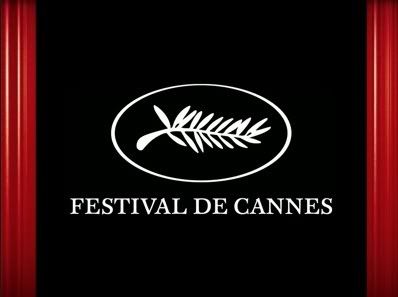
Shane Meadows
Shane Meadows who is now a well-recognised film director made a start in the film world in 1994 when he volunteered at Intermedia film and video ltd in Nottingham. Shane had a special deal with them in which he worked there for free and in return he was allowed to use their filming equipment.
It was shortly after this when he started to ask family and friends to help out with his films. As it was something he had never done before, his family and friends were slightly un-sure about what he was up to. He then had no choice, but to make his films on his own. He then showed them to his friends and family and due to how successful they went, they then wanted to help him with his short films in the future – this is what happened and as the group become more passionate about it, they were making nearly one short film a month.
The group were now making short films of a very high quality, but were annoyed as there were not really any film festivals to showcase their work at. This resulted in them setting up their own small event and this eventually became a n international festival called ‘Flip Side’.

Short film and the internet - Internet stars
With the internet, short film gone through yet another re-birth and it is now fashionable again to produce short films and people who post videos on YouTube can now become “internet stars”.
An example of someone who has in a way become well known through the internet is 20somthing Charlie McDonnell from Bath who has been posting videos on YouTube since he was a teenager. The sort of videos which he makes are vlogs (video blogs), which are all about things which happen in his daily life. His videos may be a lot different to the other short films which we have looked at as a class, but you can still categorise his videos as short films.
During the few years that he has been posting videos on youtube, all of his videos have had a large number of views and some of them have had over 1 million views – not bad for someone who just made his videos in his bedroom.
Below is a video of his in which he opened his gcse results. This shows off Charlie’s style.
Sunday 3 October 2010
Short film and the internet
In recent times, the internet has been the most common medium for short-film makers to display and promote their work. Websites such as YouTube and vimeo allow absolutely anyone with access to the internet and a video camera of some sort, to easily upload their videos.
Other sites such as coffee shorts, the BBC short film network and http://www.atom.com/ feature a large number of short films by well known directors as well as un-known directors and cover every genre of film that you could think of.


Postsecret.com - Idea gathering activity
During a lesson, we used secrets from the website www.postsecret.com to give us inspiration for thinking of ideas for storylines for short films.
This is a secret which I wrote a short film synopsis from:
“I’m so jealous of her baby”
Synopsis:
A young couple, Mark 21 and Lydia 20 broke up a year ago after having a long term relationship together. A few months after the break up, Mark entered into a new relationship with Mollie aged 21, who is now pregnant with Mark’s baby.
The film follows Mollie during her pregnancy and Lydia become jealous, as she wishes that her and Mark had a baby when they were together.
The History of short film
- 1885 – The first ever short film to be publicly exhibited is “La Sortie de l’usine”. The short of very short as the technology wasn’t advanced enough. Here it is:
- 1910 – Films started to get longer in duration and the term “short subjects” was used for the first time. The term became popular because people could now go to the cinema and see a couple of films instead of just seeing the one. Cinema was only the only forms of entertainment at the time which was accessible by the wider population. Cinema was an important part of people’s lives.
- 1930s – Hollywood studios stared to block-book films, which meant they would rent out a number of films to a cinema/cinema chain at one time. Hollywood studio companies also forced small production companies to sell their short films on to them and they would then make them into feature films. The US Supreme court later declared block-booking to be illegal. However, damage to the short film industry had already done. Feature films were started to be made and as they were of a greater duration compared to shorts, they were more profitable for films makers.
- 1940s & 1950s – Avante Garde becomes a popular style of short film
- 1960s – When television came along, this in a way saw the end of short film as it was.
- 1980s – Short film experienced a re-birth, but the short films which were being made differed a lot to the ones which were made right at the start of the original birth of the medium. They were no longer about commercial success, but were more about getting a message across.
Preliminary Task
For this prelim task we were put into groups of 3 and 4 and had to produce a short film.
The brief which Ms Pemberton had given us said that we had to remember/consider these things in our short films:
· Continuity.
· Need to film someone opening a door.
· That person then needs to cross the room and sit in a chair opposite someone else.
· The two people need to exchange some dialogue.
· Match on action
Our storyline was this: A young man (played by me) stalks his favourite celebrity Ciley Myrus (Lucy) and one day he meets her at a meet and greet session.
Our storyline was this: A young man (played by me) stalks his favourite celebrity Ciley Myrus (Lucy) and one day he meets her at a meet and greet session.
I worked with Lucy and Shaakira on this task and overall we worked very well as a team. On the first day of filming, Shaakira was away so Jerome helped us to film the majority of the footage during the filming in that session.
After filming, we then started to log & capture and then edit our footage. When doing this, we realised that a lot of our footage was shaky and that we didn't have enough footage as we were focusing on the storyline too much. During the next session when Shaakira was back in, we filmed some more footage which we added to the film. To finish off, we used photoshop to make a collage of different celebrities to use in the opening title sequence. This was a nice finishing touch.
cc
Ciley Myrus from BDC on Vimeo.
Sony V1 Camera - other side of camera
Exposure/Iris - This button controls how much light is allowed to enter the camera.
Push auto focus - this is used to quickly adjust the focus.
Push auto focus - this is used to quickly adjust the focus.
Sony V1 Camera - back of camera
White balance – this is a tool which is used to make sure that the type of lighting in what your filming looks realistic. White balance can be incorrect for example for your footage is too blue or orange. The white balance button is situated on the left hand side of the back of the camera.
If you are shooting inside, you should see a picture of a light bulb on the screen. This is there to show that you are shooting inside.
If you are shooting outside, you will see the picture of a sun on the screen.
Below shows an example of incorrect white balance and correct white balance:
Incorrect white colour balance
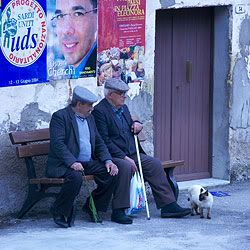
Correct white colour balance
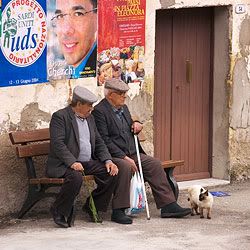
Gain – gain is linked with exposure and is used when there is not enough natural light in the place where you’re filming. Even though this can make shots brighter, it can also affect the quality too. Gain is measured in db and the camera should usually stay around 12 – the lowest which you can go to is 0 and the highest is 18.
Shutter speed – Shutter speed refers to the amount of frames which occur during a second of footage. In television, the number of frames per second is 24 and in video, the number is 50. To speed up your footage you would have to decrease the shutter speed and to decrease it, you would do the reverse. The shutter speed button can be found between gain and white balance.
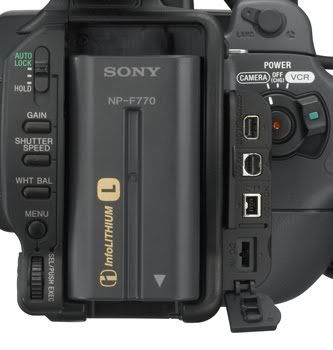
Saturday 2 October 2010
Sony V1 Camera - side of camera
Below are some pictures of the Sony V1 camera which is the camera that we use at post-16 to shoot our video productions. This model has a vast number of features within it it and below are some pictures of it as well as my notes from when, as a year group we had a workshop on filming techniques.
From the left to the right of the camera, these are the different features/buttons:
Focus - This is the first wheel at the front of the camera which is used to manually focus while filming. Focusing is something which you have to think about all the time while filming. The worst case scenario would be that you may have recorded a few hours of footage, but when it's come to the editing stage, it's all out of focus. You can switch between manual and auto focus on the button panel of the camera (just below the screen).
When setting the focus manually, one of the best things to focus on is a persons hair as there are so many elements to it.
Expanded focus - Expanded Focus is there to double check that you're actually shooting in focus.
Zoom - The wheel which is used to zoom in and out is positioned just after the focus wheel.
Status Check - The status check allows you to look at an overview of everything that is happening on the camera. This including looking at things such as what format you're filming in (HDV/DV) as well as lighting and exposure settings amongst other things.
Microphone switches - At the top of the camera are the audio inputs where you insert microphones into the camera. If you are only using one mic, then all of the switches should be left up. If you are using an additional mic as well (eg boom mic), the first switch should be down, but the rest of them left up.
One Too Many
One too many is a short film which was produced by a group of year 13s from last year while they were studying the same units that we are doing right now.
I thought this was a great short film as it evolves around a basic idea and is only set in one location (a toilet) - it's very simplistic. At the start of the film, because it is based in a toilet, as a viewer you wonder what it's going to be about. The first character that we see is a young male (who looks like he's going to throw up) going into a cubicle in the toilet. You then see the title of the film "One Too Many" on the wall - this title obviously relates to the male who looks like he's going to sick. You then can make a good guess that this film is based in a club.
The main part of the film sees two other males, first having an argument together and then having a conversation between themselves. This is happening whilst they are both going to the toilet - This doesn't sound like the most interesting idea, but due to great lighting, excellent camera work as well as very good acting, "One Too Many" is a great short film.
One Two Many from BDC on Vimeo.
I thought this was a great short film as it evolves around a basic idea and is only set in one location (a toilet) - it's very simplistic. At the start of the film, because it is based in a toilet, as a viewer you wonder what it's going to be about. The first character that we see is a young male (who looks like he's going to throw up) going into a cubicle in the toilet. You then see the title of the film "One Too Many" on the wall - this title obviously relates to the male who looks like he's going to sick. You then can make a good guess that this film is based in a club.
The main part of the film sees two other males, first having an argument together and then having a conversation between themselves. This is happening whilst they are both going to the toilet - This doesn't sound like the most interesting idea, but due to great lighting, excellent camera work as well as very good acting, "One Too Many" is a great short film.
One Two Many from BDC on Vimeo.
Friday 1 October 2010
About a girl
As the titles appear at the start of the film, they come up on the screen just like a text message would and this gives the impression that the film is going to be about a teenage girl. The title “About a girl” is very similar to the title of the film “About a boy”, so possibility the two films are going to be quite similar. As the film progresses, you see that the two films are quite like each other as they both focus on the main characters’ stories.
In the first scene of the film, the girl is seen dancing and singing in a field on her own around sunset. From this we can see that she seems like a typical girl, but also wonder where her family are as she shouldn’t be out on her own late at night as she’s vulnerable. Her identity is not given to us until the next scene, as is this scene we only see a silhouette of her and this makes us wonder what is really looks like. She’s also singing stronger by Britney Spears which she also sings again a few times as the film goes on.
During the next shot, we see the girl again, but this time she seems almost like a different person. She is portrayed in the shot as being a very strong person and she also seems very mature. The first piece of dialogue she says is: “If Jesus was alive today right, he’d probably be a singer” - A lot of girls say that when they grow up that they want to be singers and because she probably wants to be a singer herself, this is why she would have said this. Later on in the film we find out that she has started a girl band with some friends of hers.
Her parents are divorced and it’s clear that this has had an impact on her life. She refers to her dad as being a “bustard”, as this is what her mum calls him. She does see her dad, but he doesn’t seem to have a lot of time for her and the relationship they have together seems to be forced as they know they both should see each other, but don’t really want to.
She has had a very hard up-bringing and she sort of seems lost in life. Her strong personality though helps her to get on with life and when she is singing and having a laugh with her friends, you see that she’s just a normal girl.
The way in which the film ended was such a shock to me when I saw it. Towards the end of the film, she starts talking about different chocolate bars and then went on to talk about when she had a dog for a while, but as her mum didn’t know about it to start with, they had to get rid of it. They put the dog into the cannel. At the end of the film, she puts a bag into the cannel and afterwards we see that it’s a baby. We never really see the lower half of her body in the film, so you say that the baby was probably hers. As she had difficult relationships with her parents, she probably didn’t want to baby to experience that. After this, she continues to talk about chocolate bars and ice-cream as if nothing happened.
I think this was a great film as you really get to know the character throughout as even though it’s a drama, it’s sort of in a documentary style. It’s a typical British film as it’s very gritty throughout and the lighting is very grey throughout.
Wednesday 29 September 2010
Meshes of the afternoon
“Messes of the afternoon” is a film directed by Maya Deren, which is a example of a short film in the “Avant-Garde” style.
This film is typical of its style for a number of reasons. The first thing is that it doesn’t contain a clear narrative, so some shots in the film which don’t seem so clear to understand, are open to interpretation. The soundtrack of the film has a very eerie feel to it and at some points of the film makes you feel slightly uncomfortable.
The main sequence of the film sees a woman’s shadow shown walking beside a walk. We then see her body when she starts to make her journey up the stairs. She passes different things on her way up, such a telephone on the stairs. She eventually gets up to the top of the stairs and lies down to have a rest. After she closes her eyes, a figure like the grim reaper that has a mirrored face is seen outside her window – because of the style of the film, it is not clear if the figure is in her dream (if she is sleeping) or if it is actually real.
“Meshes of the afternoon” explores different subject areas such as life & death, dreams and making decisions. It also contains a number of different shots at different angles which make it visually interesting.
Maya Deren - Director
Maya Deren who was originally from Russia, moved to the USA in 1922 with her family and it was in New York where she studied at university.
In1943, Maya made her first film called “Meshes of the afternoon”. She worked on the film alongside Alexander Hammid who is well known for his work in documentary film. Both Maya and Alexander were the directors/makers of the film as well as acting in them themselves. They were married to each other at the time of making of the film.
As well of being a film maker, Maya was the author of two books: "An Anagram of Ideas on Art, Form, and Film" in 1964 and “The Living Gods of Haiti" in 1953. Her book about Haiti was documentation about her experiences of her first visit to the country. She also made a documentary about the country.
Maya took an anti-mainstream stance when making her films in order to promote the idea of artist license and creative freedom.
http://www.imdb.com/name/nm0220305/bio - last accessed on 29th September
http://www.imdb.com/name/nm0220305/bio - last accessed on 29th September
Thursday 23 September 2010
Salary Man 6
Jake Knight’s Salary Man 6 tells the story of Taishi Shiode, a Tokyo businessman who is involved in an accident which dramatically changes his life and tragically results in him losing his memory. This film follows his journey of firstly discovering that he has lost his memory and then re-tracing his steps to find out how he lost his memory.
In the opening shot of the film, we see him waking up on the floor in his workplace. Two of his colleagues who were staring at him when he was on the floor, help him stand up but then walk off straight afterwards as if nothing major had happened.
Taishi then leaves work to commute home. There is a shot of him walking in a subway on his own and this is there to symbolise what has just happened to him. He has lost his memory and is now, in a way disconnected from the rest of his city/the world. He is alone and it is his quest to find out what he had been through.
As the story progresses, we learn about the repetitive and structured life that he leads. A typical day in his life consists of waking up, going to work, going to the supermarket on the way home and then going to bed and starting the exact same routine again the next day. His daily routine is something that he didn’t seem to really think about before, but as he goes further on his journey, he sees for himself what sort of a mundane and repetitive life that he leads. He does this by setting his camera on automatic and then developing the films from the camera over a period of about a week. It is after this that he has a flashback and remembers the accident he was involved in.
I think this is a really effective short film. The idea may be quite simple, but the way it is shot and told makes this a great piece.
Friday 10 September 2010
Monday 6 September 2010
Famous quotes about short films
"Spare economic narratives, interesting storytelling, well structured work which draws in the audience quickly"
Catherine Des Forges
Catherine Des Forges
"Short films are long films that end earlier. A good idea, sufficiently told, less is more"
Gareth Evans
Comparing short and mainstream films
Today's lesson gave us a brief introduction to the differences between short and mainstream films. We also looked at short films on their own and brainstormed about the things that we would expect to see in a typical short film - I will include this diagram in my next blog.
The table below compares mainstream and short films and highlights the main differences between them.

The table below compares mainstream and short films and highlights the main differences between them.

Subscribe to:
Posts (Atom)
